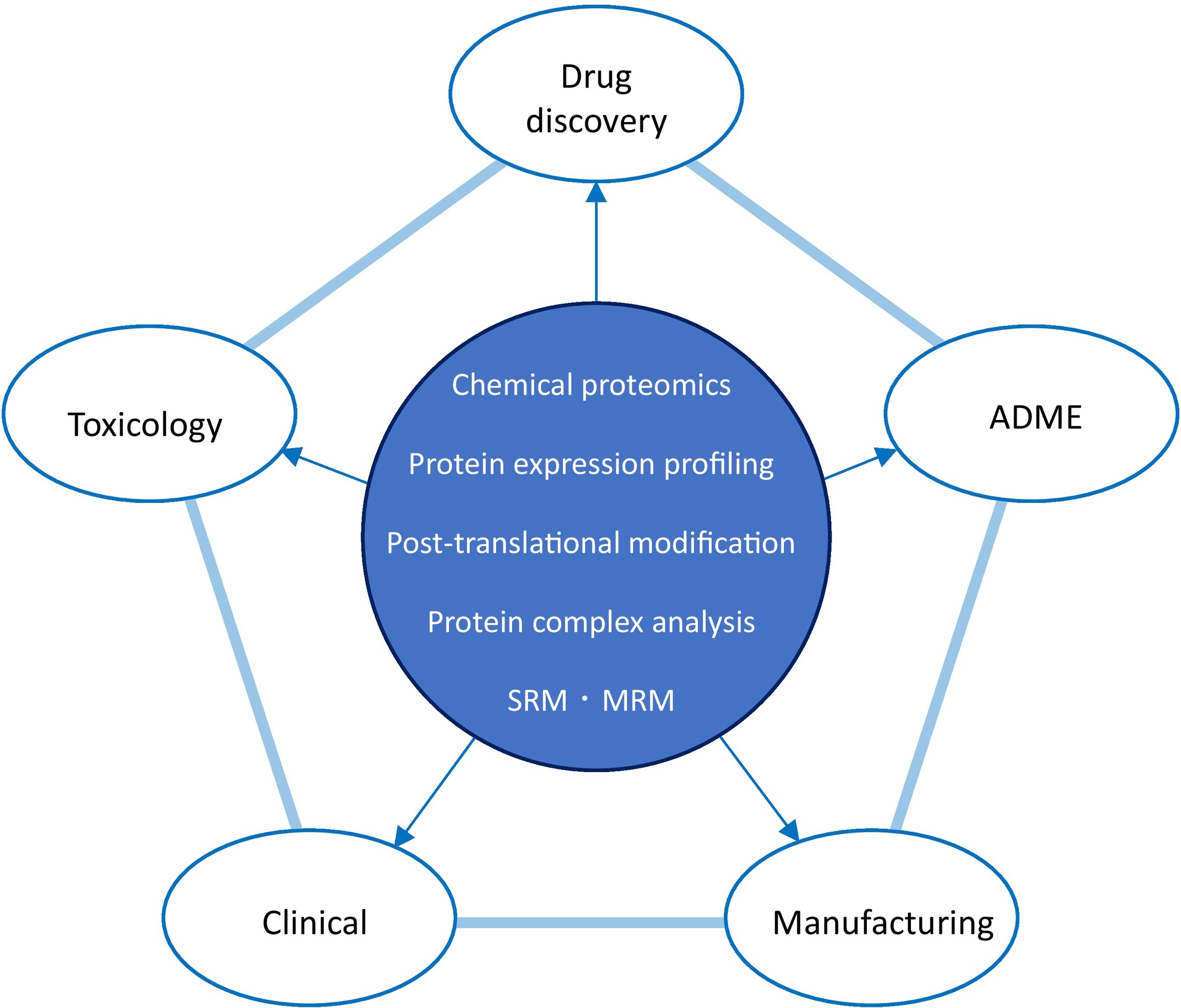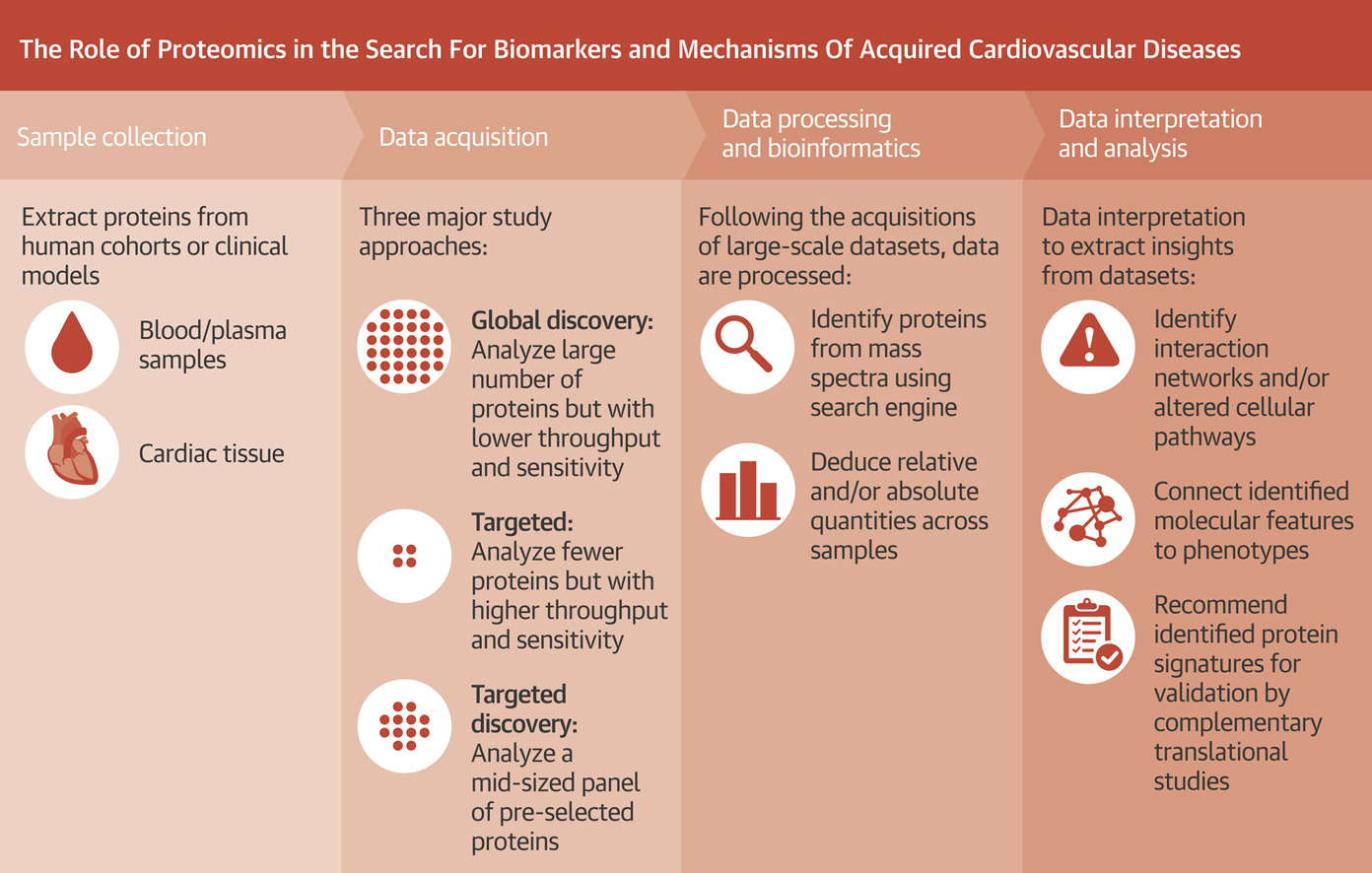Proteomics in Research Phases
Proteomics in Research Phases refers to the application of proteomics technologies across different stages of life sciences research to analyze protein expression, function, and interactions. Proteomics is a high-throughput science dedicated to studying all proteins and their dynamic changes, relying on advanced techniques such as liquid chromatography-tandem mass spectrometry (LC-MS/MS) to achieve precise protein identification and quantification, enabling comprehensive insights into biological systems. The research scope spans multiple phases, from fundamental biological studies to clinical applications, including biomarker discovery, pathway analysis, drug target identification, and personalized medicine.
Proteomics has a wide range of applications at various research stages. In basic research, it is utilized to elucidate biological mechanisms such as cell signaling, metabolic regulation, and post-translational modifications (PTMs). During preclinical studies, it aids in identifying disease-associated proteins, exploring potential drug targets, and understanding molecular mechanisms. In clinical research, proteomics enables large-scale biomarker validation, facilitating the advancement of precision medicine. Additionally, in drug development, this technology is employed to assess drug-induced protein expression and modification changes, providing critical data for new drug development and personalized therapy. Proteomics plays a vital role in biomedical sciences, agriculture, and environmental research, serving as an essential tool for advancing modern life sciences and translational medicine.

Yokota, Hiroyuki. et al. Biochimica et Biophysica Acta (BBA) - Proteins and Proteomics, 2018.
Figure 1. Proteomics Applications in Various Sections of Pharmaceutical Companies.
Services at MtoZ Biolabs
Utilizing advanced professional instruments such as high-resolution mass spectrometers and high-performance liquid chromatography systems, MtoZ Biolabs provides Proteomics in Research Phases services for high-throughput and precise protein identification and quantification. MtoZ Biolabs offers comprehensive proteomics analysis, covering sample preparation, protein extraction, enzymatic digestion, liquid chromatography separation, mass spectrometry detection, data analysis, and bioinformatics interpretation. This ensures high-sensitivity, high-resolution, and highly reproducible proteomics data to support various research applications.
Service Advantages
1. One-Time-Charge
Our pricing is transparent, no hidden fees or additional costs.
2. High-Data-Quality
Deep data coverage with strict data quality control. AI-powered bioinformatics platform integrates all proteomics analysis data, providing clients with a comprehensive data report.
3. Comprehensive Protein Quantification Analysis
MtoZ Biolabs supports various quantitative proteomics strategies, including DIA, TMT, Label-Free, and PRM, offering flexible solutions tailored to different research needs. These advanced techniques enable high-throughput, precise protein identification and quantification, ensuring reliable and reproducible data for diverse scientific applications.
4. Advanced Bioinformatics Analysis
Our services include differential protein screening, GO/KEGG pathway enrichment analysis, protein-protein interaction (PPI) network construction, and multi-omics integration. These in-depth data analysis solutions help researchers identify key proteins and regulatory mechanisms, facilitating groundbreaking discoveries in proteomics and biomedical research.
5. Customized Services
MtoZ Biolabs offers one-on-one scientific consultation, tailoring optimal experimental strategies based on customer requirements. This ensures high-quality and highly reliable experimental data, facilitating efficient research project execution.
Applications
1. Disease Mechanism Research and Biomarker Discovery
Proteomics analysis enables the profiling of protein expression under different disease states, facilitating the identification of potential biomarkers. This approach supports early diagnosis and precision treatment for conditions such as cancer, neurodegenerative diseases, and cardiovascular disorders.
2. Drug Development and Target Screening
Proteomics in Research Phases can be applied to drug mechanism studies, target identification, and efficacy evaluation. By analyzing protein dynamics, this approach helps elucidate drug effects on specific signaling pathways and protein interactions, optimizing drug screening and preclinical research for more effective therapeutic development.
3. Cell Signaling Pathway Research
Through quantitative analysis of post-translational modifications (PTMs) such as phosphorylation, acetylation, and ubiquitination, proteomics reveals the dynamic regulation of cell signaling pathways, advancing fundamental life sciences research.
4. Immunology and Tumor Microenvironment Research
Proteomics analysis enables the exploration of immune-related protein expression and function, investigating key proteins involved in inflammatory responses, tumor microenvironments, and immunotherapy. This approach provides precise data support for personalized medicine.
5. Biopharmaceutical Development and Quality Control
Proteomics in Research Phases plays a crucial role in the development and production of biopharmaceuticals such as antibody drugs, vaccines, and protein therapies. It enables monitoring of protein expression, purity, and post-translational modifications (PTMs), ensuring product stability and safety throughout the manufacturing process.
Case Study
1. Proteomics Research in Cardiovascular Medicine and Biomarker Discovery
This study aims to explore the application of proteomics in cardiovascular medicine and biomarker discovery, identifying key proteins associated with cardiovascular disease (CVD) and their potential clinical significance. The study subjects included patients with various types of CVD and healthy controls. High-resolution mass spectrometry techniques, such as LC-MS/MS, were employed in combination with data-dependent acquisition (DDA) and data-independent acquisition (DIA) strategies for protein identification and quantification. The results revealed significant alterations in protein expression levels in CVD patients, involving key biological pathways such as inflammation, oxidative stress, lipid metabolism, and vascular function regulation. Specific proteins, including plasma apolipoproteins and extracellular matrix proteins, exhibited disease-specific changes in conditions like coronary artery disease, hypertension, and heart failure, indicating their potential as novel biomarkers. Through bioinformatics analysis, the study further elucidated the roles of these proteins in CVD onset, progression, and prognosis. The findings suggest that proteomics applications in cardiovascular medicine can provide crucial insights for early disease diagnosis, personalized treatment, and novel targeted therapy strategies. Moreover, the study emphasizes the necessity for further clinical validation and functional studies to translate these biomarkers into applicable diagnostic tools and therapeutic targets.

Lam, M P Y. Journal of the American College of Cardiology, 2016.
Figure 2. Overview of Proteomics Analyses for Cardiovascular Diseases.
Deliverables
1. Comprehensive Experimental Details
2. Materials, Instruments, and Methods
3. Data Analysis, Preprocessing, and Estimation
4. Bioinformatics Analysis
5. Raw Data Files
MtoZ Biolabs, an integrated Chromatography and Mass Spectrometry (MS) Services Provider, provides advanced proteomics, metabolomics, and biopharmaceutical analysis services to researchers in biochemistry, biotechnology, and biopharmaceutical fields. Our ultimate aim is to provide more rapid, high-throughput, and cost-effective analysis, with exceptional data quality and minimal sample consumption. Free project evaluation, welcome to learn more details!
How to order?







